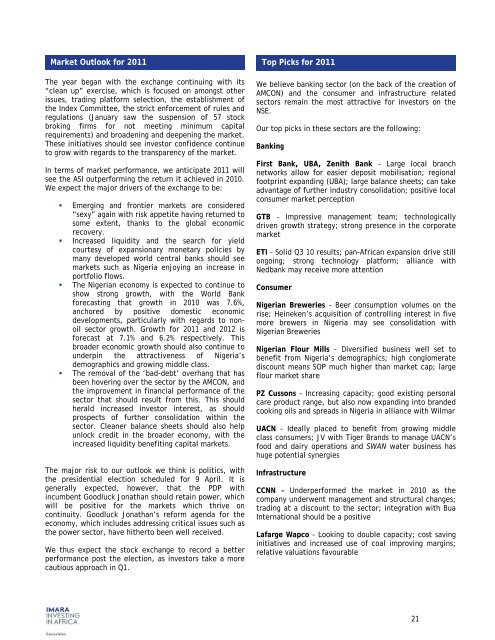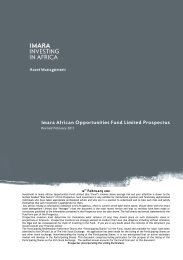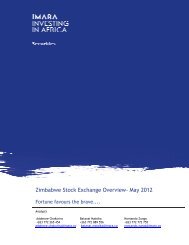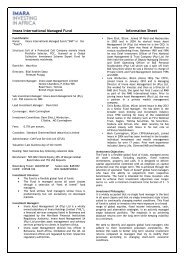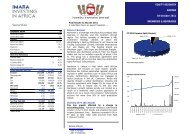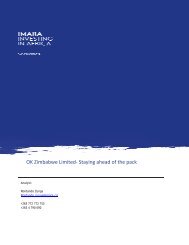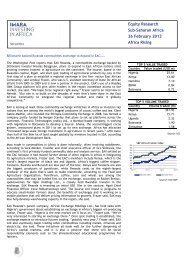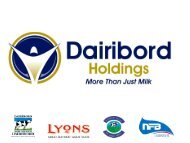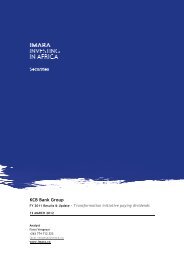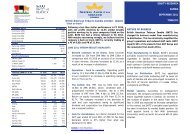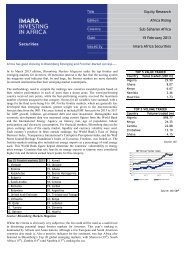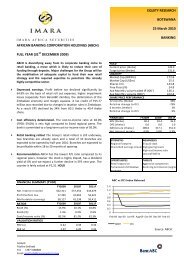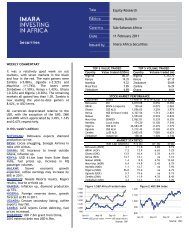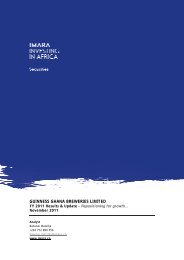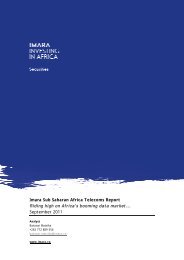Sub-Saharan Africa Stock Markets 2010 Review & 2011 ... - Imara
Sub-Saharan Africa Stock Markets 2010 Review & 2011 ... - Imara
Sub-Saharan Africa Stock Markets 2010 Review & 2011 ... - Imara
Create successful ePaper yourself
Turn your PDF publications into a flip-book with our unique Google optimized e-Paper software.
Market Outlook for <strong>2011</strong> Top Picks for <strong>2011</strong><br />
The year began with the exchange continuing with its<br />
“clean up” exercise, which is focused on amongst other<br />
issues, trading platform selection, the establishment of<br />
the Index Committee, the strict enforcement of rules and<br />
regulations (January saw the suspension of 57 stock<br />
broking firms for not meeting minimum capital<br />
requirements) and broadening and deepening the market.<br />
These initiatives should see investor confidence continue<br />
to grow with regards to the transparency of the market.<br />
In terms of market performance, we anticipate <strong>2011</strong> will<br />
see the ASI outperforming the return it achieved in <strong>2010</strong>.<br />
We expect the major drivers of the exchange to be:<br />
• Emerging and frontier markets are considered<br />
“sexy” again with risk appetite having returned to<br />
some extent, thanks to the global economic<br />
recovery.<br />
• Increased liquidity and the search for yield<br />
courtesy of expansionary monetary policies by<br />
many developed world central banks should see<br />
markets such as Nigeria enjoying an increase in<br />
portfolio flows.<br />
• The Nigerian economy is expected to continue to<br />
show strong growth, with the World Bank<br />
forecasting that growth in <strong>2010</strong> was 7.6%,<br />
anchored by positive domestic economic<br />
developments, particularly with regards to nonoil<br />
sector growth. Growth for <strong>2011</strong> and 2012 is<br />
forecast at 7.1% and 6.2% respectively. This<br />
broader economic growth should also continue to<br />
underpin the attractiveness of Nigeria’s<br />
demographics and growing middle class.<br />
• The removal of the ‘bad-debt’ overhang that has<br />
been hovering over the sector by the AMCON, and<br />
the improvement in financial performance of the<br />
sector that should result from this. This should<br />
herald increased investor interest, as should<br />
prospects of further consolidation within the<br />
sector. Cleaner balance sheets should also help<br />
unlock credit in the broader economy, with the<br />
increased liquidity benefiting capital markets.<br />
The major risk to our outlook we think is politics, with<br />
the presidential election scheduled for 9 April. It is<br />
generally expected, however, that the PDP with<br />
incumbent Goodluck Jonathan should retain power, which<br />
will be positive for the markets which thrive on<br />
continuity. Goodluck Jonathan’s reform agenda for the<br />
economy, which includes addressing critical issues such as<br />
the power sector, have hitherto been well received.<br />
We thus expect the stock exchange to record a better<br />
performance post the election, as investors take a more<br />
cautious approach in Q1.<br />
We believe banking sector (on the back of the creation of<br />
AMCON) and the consumer and infrastructure related<br />
sectors remain the most attractive for investors on the<br />
NSE.<br />
Our top picks in these sectors are the following:<br />
Banking<br />
First Bank, UBA, Zenith Bank – Large local branch<br />
networks allow for easier deposit mobilisation; regional<br />
footprint expanding (UBA); large balance sheets; can take<br />
advantage of further industry consolidation; positive local<br />
consumer market perception<br />
GTB – Impressive management team; technologically<br />
driven growth strategy; strong presence in the corporate<br />
market<br />
ETI – Solid Q3 10 results; pan-<strong>Africa</strong>n expansion drive still<br />
ongoing; strong technology platform; alliance with<br />
Nedbank may receive more attention<br />
Consumer<br />
Nigerian Breweries – Beer consumption volumes on the<br />
rise; Heineken’s acquisition of controlling interest in five<br />
more brewers in Nigeria may see consolidation with<br />
Nigerian Breweries<br />
Nigerian Flour Mills - Diversified business well set to<br />
benefit from Nigeria’s demographics; high conglomerate<br />
discount means SOP much higher than market cap; large<br />
flour market share<br />
PZ Cussons – Increasing capacity; good existing personal<br />
care product range, but also now expanding into branded<br />
cooking oils and spreads in Nigeria in alliance with Wilmar<br />
UACN – Ideally placed to benefit from growing middle<br />
class consumers; JV with Tiger Brands to manage UACN’s<br />
food and dairy operations and SWAN water business has<br />
huge potential synergies<br />
Infrastructure<br />
CCNN – Underperformed the market in <strong>2010</strong> as the<br />
company underwent management and structural changes;<br />
trading at a discount to the sector; integration with Bua<br />
International should be a positive<br />
Lafarge Wapco - Looking to double capacity; cost saving<br />
initiatives and increased use of coal improving margins;<br />
relative valuations favourable<br />
21


